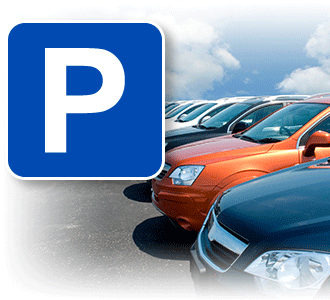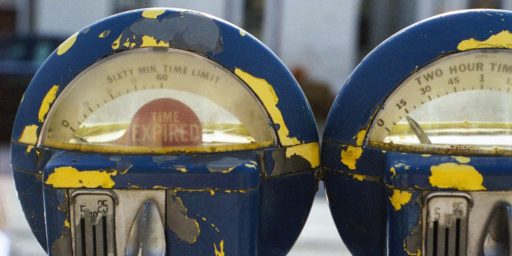Parking Policy Disconnect
 Matt Yglesias observes,
Matt Yglesias observes,
It’s a bit frustrating sometimes that the only people who seem interested in reforming parking meter policy are generally car-skeptical urbanist types like me. My interest in this, after all, is a bit second-order whereas people who actually drive cars around all the time have a strong interest in getting this right.
He then goes into a wonkish but interesting discussion about supply and demand and an expert consensus that “85 percent occupancy” is the sweet spot that pricing should aim to create that strikes me as reasonable enough.
As to Matt’s frustration, it may be that the disconnect is that parking simply isn’t an issue for most drivers, so it’s not something we’re forced to think about. Prior to moving to the DC area a few years ago, it simply never occurred to me that I shouldn’t be able to easily, cheaply, and conveniently part where ever I happened to want to shop, work, eat, or whathaveyou. It was pretty much a given that businesses would provide parking as a cost of doing business because, after all, How else could customers get there?
Really, it’s just people who drive in and around a handful of our older, more congested metropolitan areas who ever need to think about it. Aside from airports and the oldest downtown streets, parking is generally convenient and free or nominally priced even in places like Houston, Dallas, Atlanta, Chicago, and Nashville.
In the handful of cities — like DC, Boston, and Manhattan — where parking is difficult, there tends to be good public transit. Which means most of the residents either don’t own cars or they drive mostly when they’re going out of town. Those who’ve always lived that way tend to be “car-skeptical urbanist types” like Matt. And those of us who actually drive into DC and park on a regular basis tend to be suburbanites who 1) don’t get much of a say in the matter since we don’t live and vote in the city in question and therefore 2) just grumble about the inconveniences of city life and then drive home and park in our garages.
UPDATE: A friend who lives in Chicago assures me parking costs have recently escalated to well above “nominal.”






I think Matt’s frustration is part of his larger frustration with the general “everything must be tailored to driving cars” bent of our national transportation policy and the “parking must be free” mantra that goes with it.
Parking in Chicago is actually not any where near nominally priced…and that’s a good thing. Daley privatized the city meters last year and now most are market rates. We’ve seen the typical populist howling (and foreseen Daley raiding of the funds to fill budgets), but the market rate parking, along with the digital “meters” installed in most places, has been seemingly effective at easing congestion while still protecting businesses.
I know plenty of DC Metro area suburbanites (VA more than MD) who simply won’t drive into the District. They cite the lack of parking as the primary cause. That may be covering for other causes, of course.
But based on their demonstrated inability to parallel park, that may also be exactly the case.
Well, the reasons the car-skeptical urbanist types are the only ones concerned is that for the rest of us if parking is difficult we don’t go to the area. Parking meters are for people running errands, hence the time limits. So commuters and residents must find off-street parking. The other big downtown users are those going to court or government offices. Those people also need longer term parking as the visit can take all day. Parking meters are targeted at shoppers and diners. If parking is expensive or even 85% full, you’re generally going to drive off those customers unless the offering is unique enough. On crowded days and evenings, businesses provide valet parking to reduce the hassle to customers.
Why should the suburbanite care about city parking meter pricing? If it is to costly or there aren’t enough meters, they just go shop in suburbia where parking is free and generally right out front.
Back a few years ago when I worked in Silver Spring, the hot and heavy project was to restore an Art Deco row of stores at Colesville and Georgia if I remember correctly. The newspapers promoted this as the first shopping location with parking out front instead of the street, or as they are known today, the first strip mall. It just seemed odd the new urbanists would work so hard to save the proof of concept for what they hated so much.
I think a solution to people who are appearing in court or for some business that isn’t necessarily shopping or quick stops is to do what the children’s hospital where my son goes does. You carry your parking ticket into the building with you, and you collect a stamp from the receptionist that indicates you had business, and then the parking in the garage was free.
Another hospital had a small nominal fee for people who had hospital business (and the parking was free if you donated blood) and they charged more for people who used the garage but for business in the downtown area.
I live in a very rural state at this point, and there isn’t a city in the area where parking is a huge issue, so I can’t say it is something I have thought about, but I can see where people who commute for work but even more so, people who must be in the city for legitimate business that may take all day rather than the 1 or so you get with a meter would have problems.
I drove into Chicago a little while ago to consult with my financial adviser.
$23 for under 40 minutes of parking.
The best financial advice that I gleaned from the trip was….
When it comes to cities, always take the bypass!
Greetings:
A small point perhaps, but Manhattan is a borough, not a city. The city is New York City.
I grew up in the Bronx, the northern and mainland part of New York City. When we went to Manhattan, we referred to it as “going downtown”. However, when residents of Brooklyn, Queens and Staten Island (the other offshore parts of New York City) travelled to Manhattan, they usually referred to it as “going to the city”. Agreement is not a first principle in New York City.
Right. But only Manhattan is really “New York” in the traffic/parking sense, as far as I know. The Bronx is more like a traditional suburb, no? Ditto Queens and Brooklyn, for that matter?
Greetings:
Most of the parts of the “outer” boroughs with which I ‘m familiar contain mostly multi-story apartment buildings, admittedly smaller than Manhattan’s, but far from my conception of suburban. Similarly, the outer boroughs mostly have parking meters along their main drags only, but they are subject to the joys of “alternate side of the street” parking restrictions which require cars to be moved every other day so that the parking lane garbage can be swept up.
Mayor Bloomberg seems to be a supporter of limited/expensive parking. He’s in touch with his inner greenie.